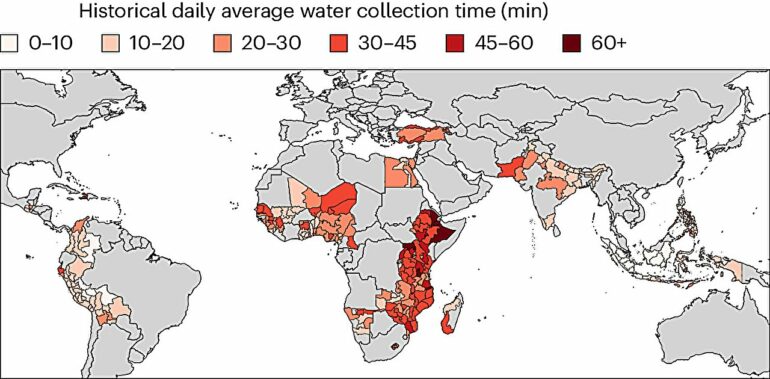Climate change could increase the amount of time women spend collecting water by up to 30% globally by 2050, according to a new study published in Nature Climate Change. In regions of South America and Southeast Asia, the time spent collecting water could double due to higher temperatures and less rainfall.
A team of scientists from the Potsdam Institute for Climate Impact Research (PIK) estimates the large welfare losses that could result from climate impacts and highlights how women are particularly vulnerable to changing future climate conditions. Worldwide, two billion people currently lack access to safe drinking water. The responsibility for collecting water typically falls on women and girls.
“Climate change leads to rising temperatures and alters rainfall patterns, affecting the availability of water. We show that for women in households without running water, the time spent for collecting water will increase in almost all regions analyzed under future climate change,” says study author Robert Carr, guest researcher at PIK.
On a global average, for the period from 1990 to 2019, women in households without running water spend 22.84 minutes every day collecting water—ranging from four minutes in parts of Indonesia to 110 minutes in regions of Ethiopia.
“Compared to these numbers, we found that women will have to spend up to 30% more time each day collecting water by 2050 under a high-emission scenario. This can be reduced to 19% if global warming is kept below 2 degrees Celsius,” says Carr.
“Regionally by 2050, daily water collection times could double under a high-emission scenario, for example, in regions across South America and Southeast Asia. For regions in eastern and central Africa that currently have the longest water collection times, temperature rises in a high-emission scenario would cause increases of between 20 and 40%,” says author Maximilian Kotz from PIK.
Globally, women spend up to 200 million hours a day on this vital task (as of 2016), which can lead to major losses of time otherwise used for education, work or leisure and can sometimes be a physical and mental burden.
Cost of lost working time could reach tens to hundreds of millions of US dollars per country and year
Based on historical data from household surveys in 347 subnational regions across four continents from 1990 to 2019, the researchers first assessed how changing climate conditions have impacted water collection times in the past.
“We find that higher temperatures and less rainfall have increased daily water collection times,” says Kotz.
There are several possible explanations for that, he adds, “From a purely physical perspective, higher temperatures and less rainfall change the balance between evaporation and precipitation, thus lowering water tables. This makes fresh water harder to access. In addition, the journey can also become more uncomfortable and thus take longer due to heat stress.”
Combining the observed patterns with temperature and precipitation projections from state-of-the-art clime models (CMIP-6), the researchers then assessed the impacts of future changes in climate on daily water collection times under different emission scenarios.
“Our results shed light on a gendered dimension of climate change impacts,” states author and PIK researcher Leonie Wenz.
“They show how strongly climate change will affect women’s well-being, causing them to lose time for education, work and leisure. By 2050, the cost of lost working time, calculated at the country-specific minimum wage, would be substantial, reaching tens to hundreds of millions of US dollars per country and year under a high-emission scenario.”
More information:
Robert Carr et al, Climate change to exacerbate the burden of water collection on women’s welfare globally, Nature Climate Change (2024). DOI: 10.1038/s41558-024-02037-8
Provided by
Potsdam Institute for Climate Impact Research
Citation:
Climate change makes it harder for women to collect water in South American and Southeast Asian regions, study shows (2024, June 21)



